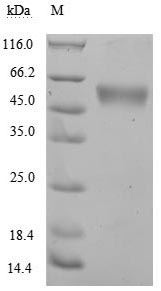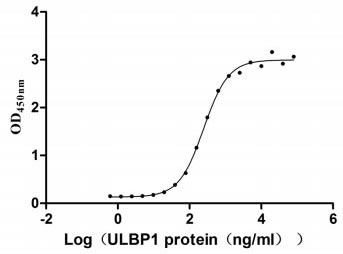Recombinant Human NKG2-D type II integral membrane protein (KLRK1), partial (Active)
Catalogue Number: CSB-MP012474HU1-CSB
| Manufacturer: | Cusabio Biotech |
| Shelf Life: | 6 months |
| Molecular Weight: | 43.6 kda |
| Physical state: | Lyophilized |
| Type: | Bioactive Proteins |
| Alias: | Killer cell lectin-like receptor subfamily K member 1 (NK cell receptor D) (NKG2-D-activating NK receptor) (CD314) |
| Host Cell: | Mammalian Cells |
| Shipping Condition: | Blue Ice |
| Unit(s): | 100 ug, 20 ug, 1 mg |
| Host name: | |
| Clone: | |
| Isotype: | |
| Immunogen: |
Description
Description: Function as an activating and costimulatory receptor involved in immunosurveillance upon binding to various cellular stress-inducible ligands displayed at the surface of autologous tumor cells and virus-infected cells. Provides both stimulatory and costimulatory innate immune responses on activated killer (NK) cells, leading to cytotoxic activity. Acts as a costimulatory receptor for T-cell receptor (TCR) in CD8+ T-cell-mediated adaptive immune responses by amplifying T-cell activation. Stimulates perforin-mediated elimination of ligand-expressing tumor cells. Signaling involves calcium influx, culminating in the expression of TNF-alpha. Participates in NK cell-mediated bone marrow graft rejection. May play a regulatory role in differentiation and survival of NK cells. Binds to ligands belonging to various subfamilies of MHC class I-related glycoproteins including MICA, MICB, RAET1E, RAET1G, RAET1L/ULBP6, ULBP1, ULBP2, ULBP3 (ULBP2>ULBP1>ULBP3) and ULBP4.
Additional Text
Uniprot ID
P26718
Gene ID
100528032; 22914
Gene Name
KLRC4-KLRK1, KLRK1
Protein Tag
hFC Tag
Storage Note
The shelf life is related to many factors, storage state, buffer ingredients, storage temperature and the stability of the protein itself. Generally, the shelf life of liquid form is 6 months at -20°C/-80°C. The shelf life of lyophilized form is 12 months at -20°C/-80°C.

